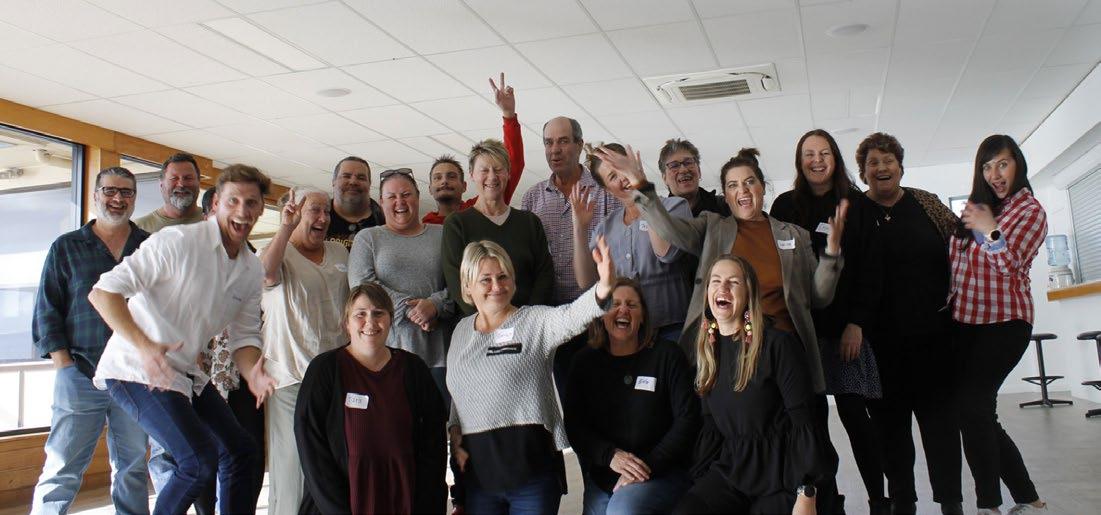
5 minute read
Perinatal Pilot Project
Upper Eyre Local Health Cluster grant funds pilot program to assist midwives to recognise and assist families with perinatal mental health.
Identified community concern about perinatal mental health and availability and accessibility of resources and support led the Upper Eyre Local Health Cluster (UELHC) to successfully apply to Country SA PHN for a grant to fund a pilot program to assist midwives to assist families at risk of perinatal depression and to break the cycle of generational trauma.
Advertisement
Pregnant women in Whyalla are allocated a midwife for their pregnancy but this care stops at eight weeks postpartum. The midwives reported that after this time, the women do not have continuing support or knowledge about available community-based support services as the midwives are also unaware. Postnatal depression can have adverse effects not only for the mother but also for the baby. Current literature discusses the importance of a community approach to health services for rural communities and that is where a network of knowledge about these services and supports can be utilised. A project advisory group was established including community members, people with lived experience of perinatal mental health issues, the UELHC chair and members, and University of South Australia (UniSA) Department of Rural Health Academics Mental Health. There was no individual cost to the mid-wives who participated in the training, and it provided CPD in full credits on completion. The group developed a six-week module-based training program in partnership with Dr Lois McKeller, Associate Professor of Midwifery UniSA Clinical and Health Sciences and Dr Tiffany Lee De Sousa Machado, Lecturer Organisational Behaviour with the Village Foundation. The modules were based around the following: • Know your population – Population health/social determinants/ socioeconomic for health for this group • Identification of PND – Screening tools and how to apply them • Comorbidity & risk factors – Risk factors for PND.
• Treatment options & where to go for help- How to escalate care, show clear pathways for escalation of care
• Partner – Support for themselves, how to support the mum, support groups etc. To assist in creating a network of knowledge, the group worked with two UniSA Occupational Therapy students, Participatory Community Practice students, Alice Petchey and Nadia Hollinshead to: ‘develop a cohesive multidisciplinary network of services and support within the community regarding perinatal mental health that is engaging and accessible to women in the UELHC’.
Having someone who lives and works in a rural location co-facilitating the training was acknowledged as extremely important as they have the lived experience of the rural context, demographic and understanding of local issues. Also, the combination of midwifery and mental health knowledge was noted as being extremely beneficial in adding to the learning.
The evaluation reported that all participants agreed that the content specifically addressed their learning needs and agreed that the program contributed to their confidence, skills, and knowledge in providing care to women experiencing perinatal mental health challenges.
Overall, this PCP project was beneficial in identifying gaps in perinatal-specific mental health supports in the UELHC and improving the engagement with existing resources. It’s anticipated that this project will lead to improved outcomes for people living with perinatal mental health challenges. It is hoped that this program could be offered to midwives in other regions to support women and their families in communities right across country South Australia.
“I really, thoroughly enjoyed the program and didn’t think I would. It highlighted the insight and knowledge that I thought I had, which I didn’t,” said participant Jenny Bury. Awaiting approval
“What I will take away is a change in language – instead of using Postpartum Depression I will talk to women about Postpartum Distress.”
“I appreciated the section on Trauma Informed Care – I would’ve liked a little more exploration about this and to have it available for more staff.”
The more staff who do this program, the more they are thinking outside the box.” The program should be mandatory, especially for all postgrads, via SA Health, Moodle, it should be mandatory. I just really enjoyed it all.”
“The webinars were well received by the nurses, midwives, and Aboriginal Maternal Infant Care (AMIC) workers who participated in the pilot education program,” said Lee Martinez.
“It is felt by many that the EPNMH Webinars are a valuable education resource that would benefit the majority of nurses, midwives and AMIC workers in rural areas.”
One member commented on how having the live facilitation brought real context to talk about things. Also writing the reflections was found to be very useful.
“It’s always good when people tell you a story” said one participant.
“The content wasn’t necessarily new to me, but I did learn about matrescence; and transition to motherhood.”
Data evaluation highlights
75%
found the program ‘very beneficial’ to their role with the remaining 25% finding it ‘beneficial’
91%
Of the 12 who completed the post-survey, completed at least four sessions with 42% completing at least five
75%
of participants rated the quality of the facilitation as excellent with the remaining 25% rating it as very good
67%
suggested that a combination of online face-to-face would be ideal
91%
found the online environment very/ moderately effective for delivering the program - however there were some difficulties connecting at times
73%
identified some barriers to attending the course – mostly due to work commitments and not having protected time to attend
100%
agreed that the content specifically addressed their learning needs
100%
of participants would recommend this program to other practitioners
100%
participants agreed that the program contributed to their confidence in providing perinatal mental health care with 42% agreed that the program ‘significantly’ contributed to their confidence and the remaining 58% stating it ‘moderately’ contributed










